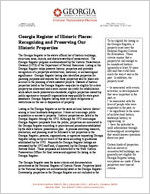Georgia Register of Historic Places: Recognizing and Preserving Our Historic Properties
The Georgia Register is the state's official list of historic buildings, structures, sites, objects, and districts worthy of preservation. The Georgia Register program is administered by the Historic Preservation Division (HPD) of the Department of Natural Resources. Listing in the Georgia Register helps preserve historic properties and provides recognition of a property's architectural, historical, or archaeological significance. Georgia Register listing also identifies properties for planning purposes and ensures that these properties will be taken into account in the planning of state assisted projects. Owners of historic properties listed in the Georgia Register may also be eligible for a state property tax abatement and a state income tax credit for rehabilitation work which meets preservation standards; eligible properties owned by public agencies or nonprofit organizations may qualify for state grant assistance. Georgia Register listing does not place obligations or restrictions on the use or disposition of property.
Listing in the Georgia Register is not the same as local historic district zoning or local landmark designation. It does not encourage public acquisition or access to property. Historic properties are listed in the Georgia Register through the HPD. Although the HPD encourages Georgia Register proposals from the public, properties are nominated to the Georgia Register according to priorities and procedures established by the state's historic preservation plan. A process involving research, evaluation, and planning must be followed to list properties in the Georgia Register; persons, organizations, or agencies requesting Georgia Register listing carry out much of this work according to guidelines established by the HPD. Requests for Georgia Register listings are reviewed by the HPD staff and, if approved, by the Georgia Register Review Board. These proposals are submitted to the State Historic Preservation Officer for final review and approval for listing in the Georgia Register.
The Georgia Register uses the same criteria and documentation procedures as the National Register of Historic Places. Properties listed in the National Register are automatically listed in the Georgia Register. Conversely, properties in the Georgia Register are not included in the
To be eligible for listing in the Georgia Register, a property must meet the National Register Criteria for Evaluation. These criteria require that a property be old enough to be considered historic (generally at least 50 years old) and that it still look much the way it was in the past. In addition, the property must:
be associated with events, activities, or developments that were important in the past; or be associated with the lives of people who were important in the past; or be significant in the areas of architectural history, landscape history, or engineering; or have the potential to yield information through archaeological investigation that would answer questions about our past.
Certain kinds of properties, such as moved or reconstructed buildings, are generally not eligible for Georgia Register listing; exceptions are made if these properties meet special criteria.
National Register unless they are separately nominated. The Georgia Register is the state designation referenced by state laws and regulations regarding state grants, property tax abatements, the Georgia Environmental Policy Act, the State-owned Historic Properties Act, and other state preservation and environmental programs.
The Georgia Register Does . . .
Identify significant buildings, structures, sites, objects and districts according to the Georgia Register Criteria for Evaluation.
Provide property and state income tax benefits to owners who rehabilitate their properties according to preservation standards.
Facilitate review of state funded, licensed, or sponsored the preservation of historic properties by documenting their significance.
Encourage the preservation of historic properties by documenting their significance.
Provide information about historic resources for planning purposes.
Enable state and local governments to consider historic properties in their planning.
Allow consideration of fire and life safety code compliance alternatives when rehabilitating historic buildings.
Qualify public agencies and nonprofit organizations to apply for state grant assistance for rehabilitating eligible properties.
The Georgia Register Does Not . . .
Restrict the rights of private property owners in the use, development, or sale of private historic property.
Automatically qualify properties for property and state income tax benefits; qualify property owners for federal historic preservation investment tax credits.
Stop state or federally assisted development projects; or require review of local or privately funded projects that may affect historic properties.
Provide a marker or plaque for registered properties (property owners may obtain markers or plaques at their own expense.
Require review of local or privately funded project that may affect historic properties.
Automatically invoke local historic district zoning or local landmark designation.
Mandate the use of code compliance alternatives if public safety is at risk.
Guarantee that grant projects automatically will be funded.
For more information, visit our Web site at www.gashpo.org or contact Gretchen Brock, National Register Coordinator
at 404-651-6782 or gretchen.brock@dnr.state.ga.us.
revised December 2009
